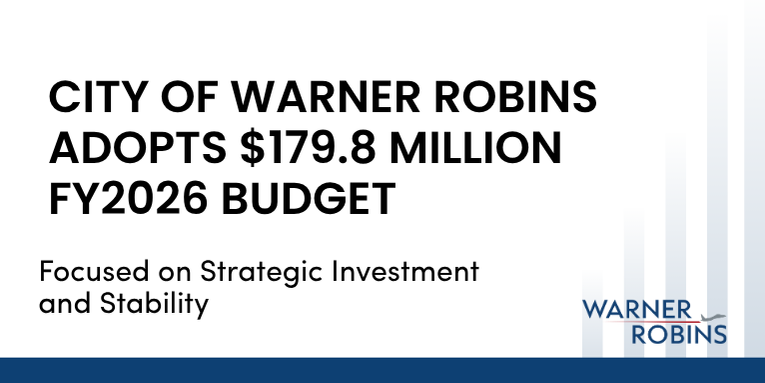Warner Robins, Georgia - The City of Warner Robins is pleased to announce the adoption of its Fiscal Year 2026 budget, totaling $179,863,519. This action-oriented budget reflects the City’s continued commitment to delivering essential services, supporting infrastructure, and maintaining fiscal responsibility, all without raising the historically low property tax millage rate of 8.953 mills.
“This is a strategic, future-focused budget that meets the needs of today while building a stronger more vibrant Warner Robins of tomorrow,” said Mayor LaRhonda Patrick. “Our investments in infrastructure, public safety, and economic development reflect the innovative momentum we’ve built over the past three years.”
Key Priorities and Investments
The FY2026 budget is guided by five core strategic goals established in collaboration with City Council and informed by public feedback:
Ensure a safe and welcoming community
Stimulate economic development and revitalization
Enhance roads, sidewalks and travel access
Strengthen fiscal stewardship and government effectiveness
Enhance the quality of life of all residents
Major investments include:
$6.7 million toward immediate infrastructure improvements such as roads, sidewalks, and utilities
$25.3 million reserved for future capital projects, including parks, public facilities, and equipment upgrades
Over $39 million (53% of the General Fund) dedicated to public safety, supporting police, fire, and emergency response capabilities
Funding to support 635 full-time equivalent positions, ensuring continued delivery of high-quality services
Addressing Economic Pressures Without Raising Taxes
Faced with uncertain revenues tied to the statewide floating homestead exemption and a broader economic slowdown influenced by national and global trends, the City of Warner Robins took a strategic approach to balancing the FY2026 budget. Rather than shifting the burden to taxpayers through a millage rate increase, the City opted to responsibly utilize reserve funds to absorb rising costs.
“Instead of passing increased costs on to our citizens, we made the intentional decision to dip into our reserves,” said City Administrator James Drinkard. “This approach allows us to maintain services, invest in our priorities, and buy time as we work to diversify our revenue streams and reduce long-term reliance on property taxes.”
Organizational and Financial Improvements
FY2026 also introduces significant organizational changes to improve efficiency and responsiveness:
Consolidation of financial operations into a central Finance Department
Reallocation of Code Enforcement to the Police Department
Shift of Parks and Athletic Field Maintenance to the Recreation, Parks, and Cultural Services Department
Additionally, a new mid-year budget review process will begin in January 2026 to evaluate trends and make data-driven adjustments if necessary.
Looking Ahead
In FY2026, Warner Robins will also launch a multi-year financial outlook process to assess long-term needs in infrastructure reinvestment, capital project funding, and workforce sustainability. The City continues to explore diversified revenue streams to reduce dependency on property taxes.
“We’ve built this year’s budget on conservative revenue projections so we’re prepared for whatever the economy may bring,” said Mayor LaRhonda Patrick. “While we are tightening our belt, we remain committed to expanding and improving the services our residents rely on every day.”

